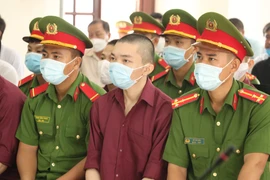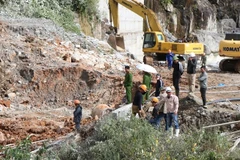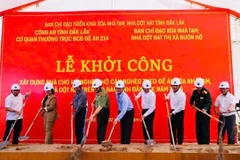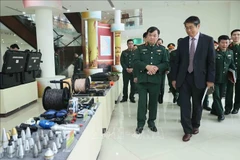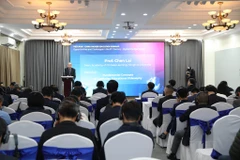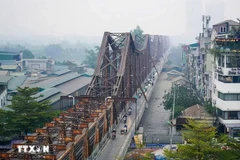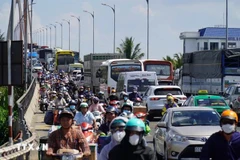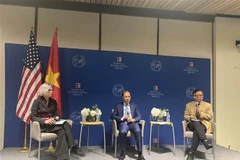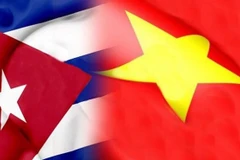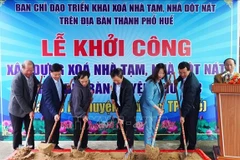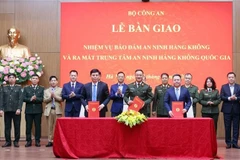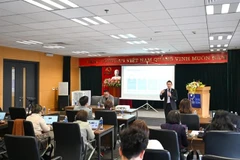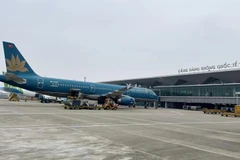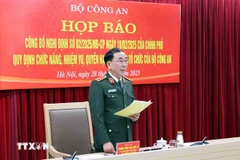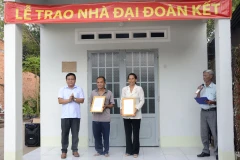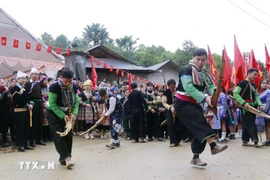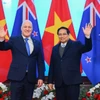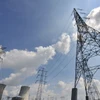
Hanoi (VNA) – US-based Foreign Policy magazine has run an article highlighting the Vietnamese government has been “deeply transparent with the public during the COVID-19 crisis”.
The press and media in Vietnam have contributed to creating social consensus and building public trust to combat the pandemic, according to the article.
The comment on the role of the press and media in the Southeast Asian nation during the pandemic fight can be taken as a most vivid demonstration of the efforts to ensure freedom of speech and freedom of information in the country.

International media have repeatedly highlighted information transparency and clearness when they touch upon Vietnam’s keys in effectively containing pandemic outbreaks.
Many foreign officials and experts have also lauded the Vietnamese government’s effective utilisation of the high number of internet users who make up more than 70% of the national population to provide updates on the pandemic situation and instruct people to follow pandemic prevention and control measures.
In an article posted on the Asia Times, David Hutt, a freelance political journalist and analyst, wrote that the Communist Party of Vietnam has earned local and foreign plaudits for its firm COVID-19 containment measures.
Similarly, the live broadcast of the question-and-answer sessions and debates at the National Assembly over the country’s hot issues has received a strong support from voters nationwide.
This helps to further spread information and ensure that the legislature’s activities are more open, transparent and closer to voters and people, making it easier for them to supervise the NA’s performance.
Press agencies have also provided information in a timely, open and transparent way on the handling of senior officials who have violated regulations, and this has helped cement the public’s confidence in the Party and the State’s efforts in fighting corruption and other negative phenomena.
Yet, a number of organisations like the “Freedom House” and the Reporters Without Borders (RSF), together with some hostile forces, have always attempted to distort and criticise freedom of press and freedom of speech in Vietnam.

Last May, the organisations listed Vietnam in the group of countries without freedom of Internet and freedom of press. This was not the first year the Freedom House and the RSF had raised such subjective, one-sided and inaccurate comments on Vietnam.
Hostile forces appear to have deliberately ignored the fact that ensuring freedom of speech and freedom of press for all the citizens within the legal framework is Vietnam’s consistent policy.
The Vietnamese Party and State have always been respecting and guaranteeing human rights, including the right to freedom of speech of citizens.
The freedom was enshrined right in the first Constitution of the Democratic Republic of Vietnam in 1946 which said in its Article 10: “Vietnamese citizens have the rights to freedom of speech, freedom of publication, freedom of association and meeting, freedom of belief, freedom of residence and freedom of movement within the country, and can freely travel abroad and return home from abroad.”
The 2013 Constitution, in its Article 25, also affirms that the citizens shall enjoy the right to freedom of opinion and speech, freedom of press, freedom of access to information.
Along with the 2016 Press Law and the Law on Access to Information, the Vietnamese legal framework on the right to freedom of speech, freedom of press and freedom of access to information has been basically adequate and harmonious, matching international law on human rights.
Like other countries in the world, Vietnam has rolled out regulations to limit and prevent the acts of taking advantage of freedom of speech to infringe upon national interests, as well as legal rights and interests of organisations and citizens.
The 2018 Law on Cyber Security which officially came into force on January 1, 2019, proves Vietnam’s efforts in ensuring social safety and order on the cyber space, thus protecting people’s freedom of speech, freedom press and freedom of internet.
The Vietnamese press has always served as an effective, transparent and widespread social criticism and information channel of authorities of all levels and people of all social strata.

Apart from the task of popularising guidelines of the Party and policies and laws of the State, and providing information about all social activities for the people, the press has also served as a forum for the people to express their wishes and political viewpoints, participate in criticism, raise proposals regarding socio-economic, cultural, national defence-security policies, and engage in State and social management.
People can directly participate in law building, policy making and decision making on the country’s important matters by discussing, contributing their opinions and expressing their opinions and viewpoints on all aspects and fields through the press.
As of April 2022, Vietnam counted 816 press agencies, of which 115 newspapers and 116 magazines offered both print and electronic editions, 29 newspapers and magazines with online editions, and 72 agencies licensed to operate in both radio and television sectors. About 41,600 people were working in the press, of whom 17,161 had been granted with press cards for 2021-2025 as of August 15, 2021.
The figures reflect the strong development of the press in Vietnam over the past years.
Along with the IT development, the Internet and social networks have become a popular tool for every individual and organisation to express their viewpoints, spread information and exercise their freedom of speech.
The “Digital 2022: Vietnam” report conducted by We Are Social and Hootsuite shows that there were 72.1 million internet users in Vietnam in January 2022, accounting for 73.2% of the total population. Such social networks as Facebook, Zalo, Youtube, Instagram and Tiktok are dominant in the Southeast Asian nation.
The increase of 3.4 million Internet users in Vietnam between 2021 and 2022 reflects the expansion and noted development of the Internet use in the country.
Vietnam is now ranked the 12th worldwide and the 6th out of the 35 countries and territories in Asia in the number of internet users. The country has also accelerated the realisation of the target of “national digital transformation” towards each citizen having one smartphone and each household having one high-speed optical fibre Internet line.
These efforts by the Vietnamese government aim to promote the right to access the Internet for all. The Internet makes it easier for Vietnamese to access information by big news agencies worldwide like AFP, AP, Reuters, Kyodo, Economist, Financial Times, and New York Times.
Such figures also create a vivid picture of freedom of speech and freedom of press in Vietnam, which is an objective, undeniable, and irrefutable reality.
However, the Freedom House, the RSF and a number of hostile and reactionary organisations have regularly made groundless allegations about Vietnam's "suppression" of people’s freedom of speech, freedom of press and freedom of opinion.
The reality shows that Vietnamese law only punishes those who take advantage of the right to freedom and democracy, including freedom of Internet and speech, to conduct distortion, undermining and fraud acts, spread fake news and steal information, harming the interests of the Party, the community and individuals, and dividing the great national solidarity bloc.
Quite a few people have taken advantage of the freedom of speech and social networks to post many video clips with anti-Party and State contents, distort the internal political situation, defame the reputation of high-ranking leaders, incite demonstrations, cause disorder, and disturb security.
Their main maneuvers are to create and use social networks with servers based abroad to spread harmful information, especially on the occasions of important national political, economic, cultural and social events.
In 2021 alone, tens of thousands of pieces of such information online were prevented from spreading and removed.
Most recently, on October 9, competent authorities quickly handled the case where a personal Facebook account was used to post unverified information about depositors rushing to withdraw their money from banks, which caused public concerns and negatively affected the operations of banks as well as social security and order.
Vietnam’s enforcement of the Law on Cyber Security is intended to ensure a healthy cyber space for Internet users in the country. It is obvious that when raising comments on the freedom of Internet in Vietnam, the Freedom House, the RSF and hostile forces have deliberately turned a blind eye to the fact that not only Vietnam but also more than 180 countries worldwide have promulgated the cybersecurity law or legal regulations on cyber security as part of their codes to ensure national security.
Many countries such as the US, Germany, France, the Republic of Korea and Singapore have also issued provisions to strictly handle violations on the cyber space.
It can be seen that the annual reports or rankings by the Freedom House, the RSF and some other human rights organisations and hostile forces are always subjective, showing one-sided and prejudiced views, mainly based on information they gather from anti-government forces, not on the opinions of the Vietnamese people themselves. Such pieces of information have failed to reflect the reality of freedom of press and freedom of Internet in Vietnam.
The Vietnamese Party and State always respect and protect people's right to freedom of speech, freedom of press and freedom of Internet.
The stubborn deliberate distortion of the truth by the Freedom House, the RSF and some hostile forces lays bare a lack of goodwill towards Vietnam.
The vivid truth about the results that Vietnam has achieved in ensuring human rights, including freedom of press and freedom of Internet, is a steel-like answer./.

